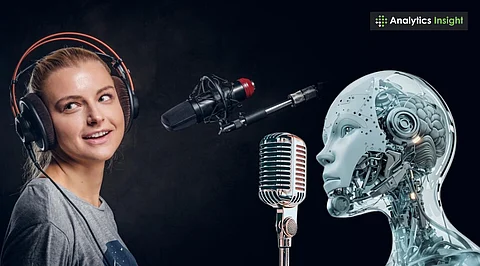

AI voice technology is advancing rapidly, offering realistic and customizable speech synthesis.
Human voice artists still hold an edge in emotion, nuance, and creative expression.
The future likely involves AI complementing, not fully replacing, human voice talent.
Artificial intelligence is reshaping the entertainment industry, especially the voice acting domain. AI voice-overs are increasingly being used in audiobooks and cartoons, making it difficult to identify if it's a real person or computer-generated speech. This has sparked a heated debate over the impact of this technology on future job prospects - Will AI replace actors, or will they just be used for assistance?
AI voice technology works using deep learning techniques. The systems are trained on large volumes of voice recordings, educating them on how humans talk or pronounce words. They are further programmed to pick up different tones and accents.
The newest text-to-speech tools are really good at copying accents. They have managed to replicate how people emphasize words and identify the little quirks that make a voice unique.
Also Read: AI Voice Generator: Revolutionize YouTube Content Creation
There are a few reasons why AI voice tools are getting so popular:
1. Speed: A real-sounding audio file can be generated as soon as the script is ready.
2. Cost-Effective: Companies don't have to pay voice actors, rent studios, or spend resources on editing.
3. Quick Edits: Machine-generated voices can be easily tuned or redone in minutes.
4. Accessible: The tool doesn’t require any planning for scheduling dates, as it would be necessary with voice actors.
These advantages make technology really appealing for online courses, ads, and games, where they need a lot of voice work done quickly.
Also Read: Adobe AI Tools Launches Firefly for Voice-Generated Sound Effects
Adding real emotional depth, natural pauses, and the genuine warmth of a human voice are difficult to produce through machines. It can sound okay for short, simple recordings that give information, but it isn’t suitable for performances that need improv, jokes, or real emotion.
Furthermore, if a machine learns to copy a real person's voice without permission, it could be used for digital crimes like using fake audio to mislead or scam people.
Voice acting is more than just reading words and requires one to change their tone to match what the characters are feeling. Animation and video games need unique voices and personalities that fit each character and connect with the audience.
While technology might not be able to replace voice actors, it hints towards an interesting collaboration. AI can be used for fine-tuning and quicker edits, and the actors can focus on being creative.
This can make production faster while still keeping the human element where it matters. Some voice actors are already using artificial intelligence to help them, saving time and helping them keep things consistent across different projects.
With the recent technological advancements, some ground rules and maybe even some laws are necessary to protect voice artists’ creative rights. Voice licensing agreements, asking for permission before using a voice, and watermarking could help stop people from misuse. Unions and groups that support actors are already pushing for rules that make sure they get paid fairly when machines copy their voices.
Artificial intelligence is changing the voice-over industry by making workflows faster, cheaper, and more flexible. However, it cannot replace the depth and feelings a human voice brings. Finding the right balance between tech and human creativity is crucial.
1. Is AI completely replacing human voice artists?
No, AI is complementing the industry but not fully replacing human talent.
2. What makes AI-generated voices appealing?
They offer speed, cost-effectiveness, and multilingual capabilities.
3. Why do some industries still prefer human voice artists?
Humans bring emotional depth, nuance, and authenticity that AI can’t fully match.
4. Can AI voiceovers be used for commercial projects?
Yes, many brands now use AI voiceovers for ads, videos, and customer service.
5. Will AI impact voice artists' job opportunities?
Yes, it’s changing demand, but it also opens new roles in AI training and voice licensing.
